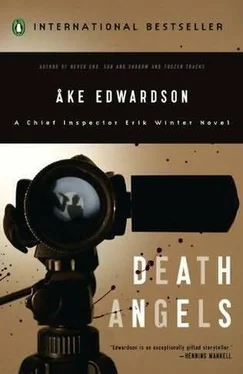Winter had read a lot about the cognitive neuroscience of memory. A lineup could either make or break the prosecution’s case.
Police screwups always resulted from clumsiness or ignorance. The human psyche was specially equipped to distinguish between different faces, no matter how similar, and the brain employed a separate system for storing and processing facial information.
He dialed Ringmar’s extension. “Could you come in for a minute, Bertil?”
Ringmar arrived, a flush of excitement in his face.
“You’re looking frisky,” Winter said.
“This might be the light at the end of the tunnel.”
“What tunnel?”
“The one at the beginning of the light.”
“I’ve read through Beckman’s interrogation, and I think he’d be willing to tell us more now,” Winter said.
“Could be, but he’s not much of a witness. He didn’t actually see a crime being committed.”
“We’ll question him again, and take a more cognitive approach.”
“You took the words right out of my mouth,” Ringmar said sarcastically. There were certain expressions that always perturbed him. Winter didn’t understand why.
They would ask Beckman new, more open-ended questions. Leave more pauses for him to fill in. The purpose of the cognitive method was to impose various memory-improving techniques on the witness. They would get Beckman to describe each detail, to relate everything he had seen in a different order and from different points of view.
“We can’t afford to slip up,” Winter said.
“You’re starting to repeat yourself.”
“I want seven decoys in the lineup.”
“You got it.”
Just enough people to fill the first couple of rows of a streetcar, Winter thought.
They would do the same with Svensson, Jamie’s boss. He might be able to recognize the face of the new customer who had popped up at his bar from time to time.
“It’s important to find exactly the right ones,” Winter said.
“You mean the decoys?”
“Yes.”
“That goes without saying.”
They couldn’t very well put Vikingsson next to seven homeless people. Finding the right combination was always a nightmare.
“Cohen is going to question Vikingsson again,” Ringmar said.
“I know. I’m about to head for his office now.”
“We’ve found out a little more about Vikingsson’s background, or personal life.”
“He hasn’t got a family, from what I’ve heard.”
“Neither a wife nor children, if that’s what you mean by family.”
“Yes.”
“He’s not gay.”
“I thought so at first,” Winter said.
“Really?”
Winter remembered the unauthorized search he and Macdonald had conducted in London. No need to mention it, not yet at least. He had seen certain signs, little details that were familiar to him. He thought of Mats. “It doesn’t mean much one way or the other,” he said.
“Except that all the victims were young males.”
“And that there might be a sexual motive that has escaped us thus far.” Winter suspected that such a motive did exist, at least indirectly. The murderer had taken advantage of the victims’ confusion, their search for a sexual identity. It was the simplest thing in the world to do. They might call themselves the ironic generation, or maybe it was adults who referred to them that way. Perhaps they had it together on the outside, but they were looking for something deeper. Beneath it all was a kind of faith. That was both their salvation and their vulnerability. “Kids are so defenseless,” he said.
“Only kids?”
“They’re the easiest people to lead astray.”
“You’re not so old yourself.”
“People take advantage of me, but not that way.”
“You mean it’s all society’s fault.”
“Certainly.”
“Has it always been like that, do you think?”
“Society ends up with the adults it deserves. It’s just a little more obvious nowadays.”
“So there’s nothing left to hope for?”
“I don’t know, Bertil.”
“What are you doing next New Year’s Eve?”
“If you’re asking whether I’ll have a reservation at a restaurant, the answer is no.”
“You’ll sit in your living room and play Coltrane for a beautiful woman.”
“That’s a pretty safe bet.”
“Which reminds me. We’ve already talked to a couple of Vikingsson’s female acquaintances in Gothenburg. He’s got his share.”
“I saw that in the report. Does he sleep around?”
“You’re thinking about another time.”
“What time was that?”
“Just before a homosexual flight attendant brought HIV from Africa to New York.”
“Have you asked him about that urban legend?”
***
Winter felt Vikingsson’s eyes on him as he walked into the interrogation room. He was taller, his hair longer, than the photos had suggested, and he looked like someone who could account for his actions. He’s got a good memory, Winter thought.
Cohen shuffled his papers. Winter nodded briefly and sat down. Vikingsson fidgeted in his chair, searching for the right defensive posture.
“This is Chief Inspector Erik Winter,” Cohen said. “He’ll be sitting in on our conversation.”
Winter nodded again. Vikingsson raised his index finger as if to say he had decided to play along.
Cohen began this interrogation the same way he had so many before. He focused on what Vikingsson was doing at the time of the murders.
At several points, Vikingsson apologized sarcastically for not having walked around with a diary strapped to his chest.
COHEN:The friend you claim to have been with on Saturday is unable to confirm that you spent the whole evening together.
VIKINGSSON:Nobody’s got a perfect memory.
COHEN:Are you saying she forgot what happened?
VIKINGSSON:Yes.
COHEN:Okay, we’ll get back to that. Tell us what you did on the twenty-fourth.
VIKINGSSON:I had just returned from London and picked up a few things at my apartment.
COHEN:What kinds of things?
VIKINGSSON:Toiletries.
COHEN:You have two apartments, is that correct?
VIKINGSSON:You already know…
COHEN:I didn’t catch your answer.
VIKINGSSON:That’s not something you have to ask me.
COHEN:How long have you had two apartments?
VIKINGSSON:I wouldn’t call it an apartment.
COHEN:What wouldn’t you call an apartment?
VIKINGSSON:The place in Gothenburg. It’s more of a…
COHEN:I didn’t hear what you said.
VIKINGSSON:It’s a crash pad.
COHEN:How long have you had it?
VIKINGSSON:A while. You can check up on that easier than I can.
COHEN:I’m going to ask you again how long you’ve had the apartment.
VIKINGSSON:Six months, maybe.
COHEN:Why did you rent it in the first place?
VIKINGSSON:The pad in Gothenburg?
COHEN:Yes.
VIKINGSSON:I wanted somewhere to get together with friends when I wasn’t working.
COHEN:But you don’t get together with friends in Gothenburg. VIKINGSSON:What?
COHEN:You can’t prove that you were with anyone at the times we asked about.
VIKINGSSON:That’s your misfortune.
No, it’s your misfortune, Winter thought. He scrutinized Vikingsson. There wasn’t a drop of sweat on his forehead, nor was he squirming in his chair anymore. No nervousness to his gestures. Winter wondered how crazy he actually was.
Читать дальше












